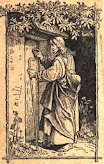What is it like to be a priest or religious?
Priestly life lived in configuration to Jesus Christ, Head and Shepherd, must necessarily manifest and give witness to the radicalism of the Gospel. In other words, priests are called to a way of life that gives evident and transparent witness to the power of the Gospel at work in their lives. (Program for Priestly Formation, The Life of Priests)
It is wonderful to be at peace with yourself knowing you are doing what you are supposed to, helping people, teaching them about God's love, and helping them in the Sacrament of Confession.
What defines a priest, nun or any consecrated person is the positive offering he makes of his life to Christ. He takes all he is and offers it to Christ. He lives only for him. This means fundamentally that he chooses Christ over any other human to be the center of his life (chastity), he values Christ more than any material thing and he gives these up in order to possess Him totally (poverty), and he is totally dedicated to His will and His work (obedience).
The practical way the vows of chastity, poverty, and obedience are lived out will depend on the particular charism of the order or group he is called to. The limitations he imposes on himself are really the means he puts in place so that his self-donation to God will be sincere and safe and will grow and deepen over time. So, there are some orders that are contemplative, and these sisters voluntarily commit to live behind closed doors in a life of prayer and penance, others are more active; some will need all their members to pursue higher studies, others will not; some are missionary and their members serve abroad, the amount and type of contact with one’s family also varies from one order to the next.
The diocesan priests reside in rectories. There are small rectories and large, old and new, in run-down neighborhoods that have seen better days with three bolts on every door and in the swankiest of suburbs; some priests have a suite, a good office, lots of help; others live and work in cramped places that seem like afterthoughts. Even more striking that the external conditions are not what matter, they are many and varied, but invariable is that nine times out of ten, you always find men who are happy where they are, who love their priesthood, live for their people, and give year after year of service, always on call, sharing all they have. What is amazing is not that some men live like that, but it is the vast majority of priests that do.















